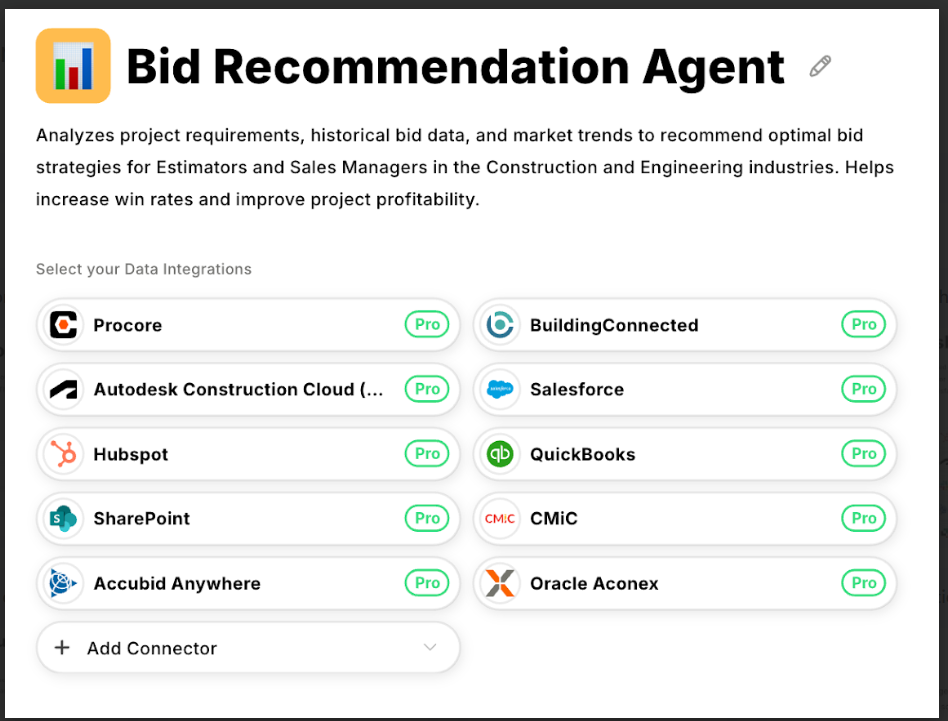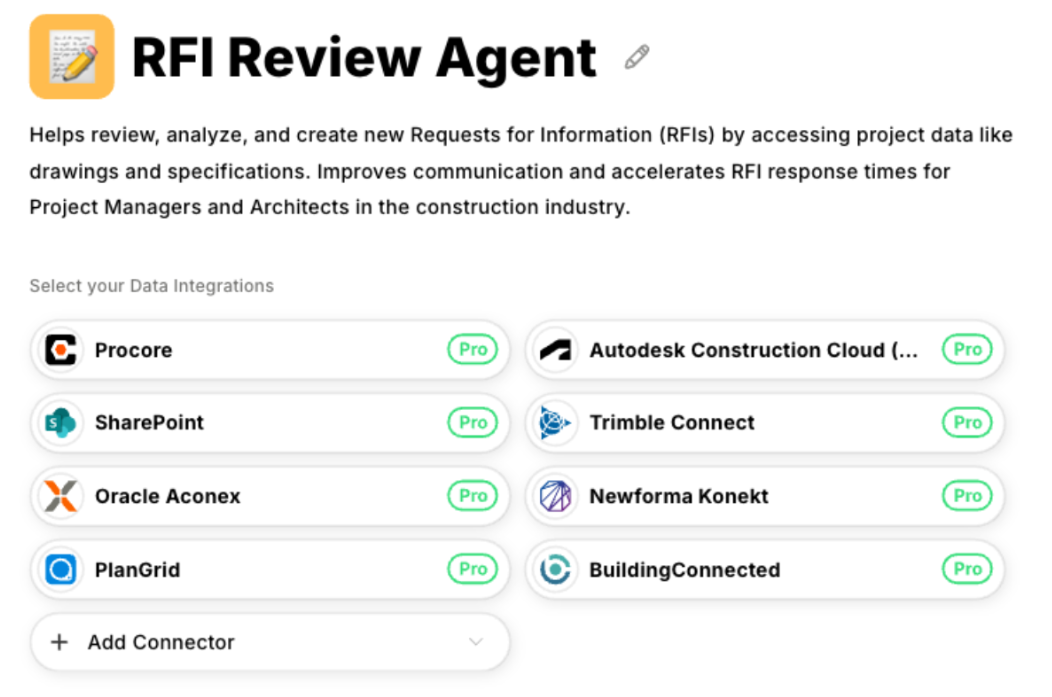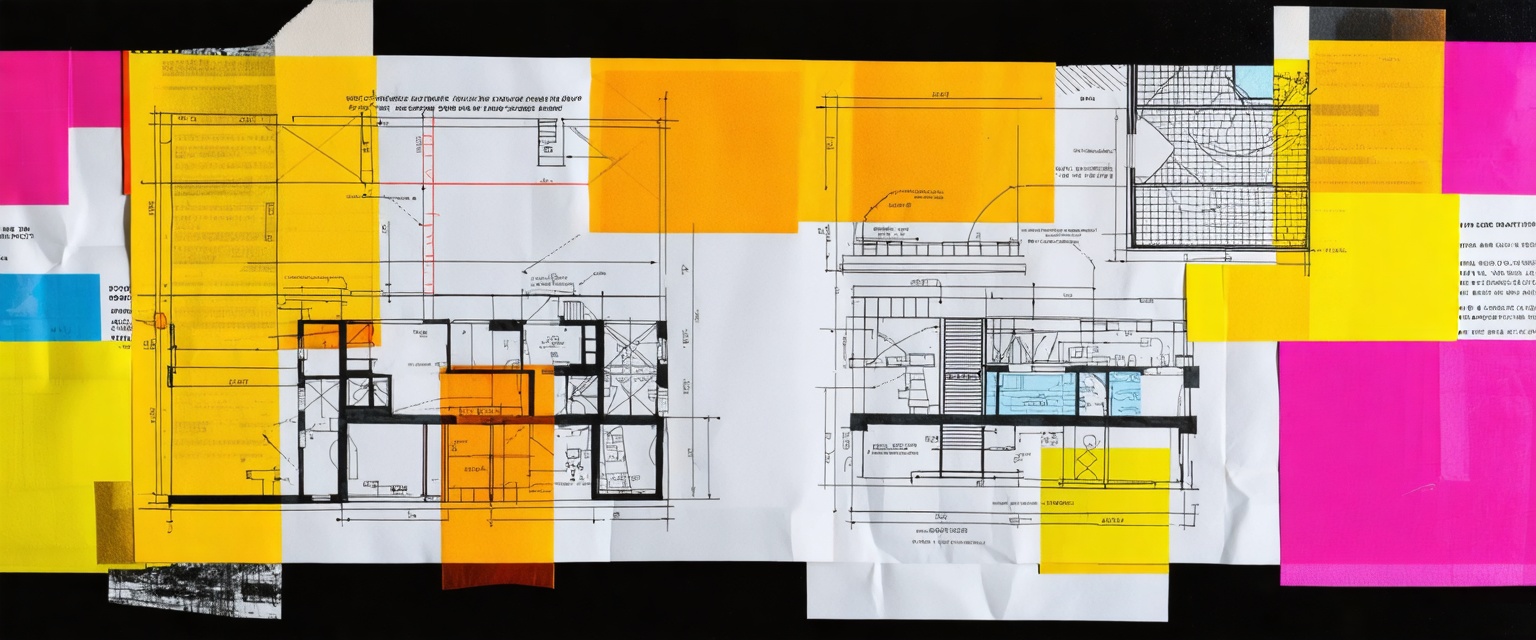Construction teams waste most of proposal time on manual data extraction from massive RFP documents. When a new tender arrives with a two-week deadline, estimators and project managers scramble through hundreds of pages, manually copying specifications and hunting for compliance requirements.
Teams routinely sink entire workweeks into assembling a single proposal, only to discover missed requirements or outdated cost data that kill their chances.
AI agents are now eliminating this data processing bottleneck. Instead of manual document scanning and data entry, intelligent automation extracts specifications, flags compliance gaps, and generates responses using your existing project database.
The following sections reveal nine challenges in RFP and bid document processing—from specification extraction to risk analysis, and how AI agents transform each—freeing your team to focus on strategy and client relationships instead of document management.
Challenge #1: Manual Spec Extraction Bleeds Hours
Construction teams know the drill: open a 600-page RFP and watch the clock start ticking. You have days, not weeks, to pull every requirement, certification, and deadline buried in dense legal language.
Manual specification extraction routinely eats most of the total proposal time, forcing skilled estimators into copy-and-paste mode instead of value engineering the bid.
Imagine a mid-size general contractor parking two estimators in a war room for five straight days just to isolate requirements for a municipal water-treatment project—an entire week with zero progress on pricing or strategy.
AI agents now give you those hours back. On modern platforms like Datagrid, you can upload your document set, and an AI agent immediately scans every page, classifies sections, and surfaces the specs that actually drive your estimate: performance criteria, material standards, bond limits, and insurance thresholds.

Thousands of pages become a structured data table in minutes, ready to feed your takeoff software or cost model. That reclaimed week lets you sharpen quantities, negotiate supplier pricing, and craft a narrative that wins—not scramble to meet a deadline.
Intelligent automation handles the data processing so you focus on the parts of the bid that move the needle.
Challenge #2: Hidden Compliance Landmines Tank Scores
You can craft a flawless technical approach, only to watch the bid unravel because a tiny certification box stayed unchecked. Construction RFPs contain hundreds of compliance obligations—licenses, safety records, insurance limits—often buried in dense legal language across dozens of attachments.
Public-sector clients enforce "all-or-nothing" rules: miss one document and your proposal never reaches the scoring table, no matter how competitive your price.
Imagine your team spends three weeks perfecting a municipal facilities proposal. On submission day, a welding-inspection certificate on page 87 slips through review. The city's portal auto-flags the omission, and your bid is rejected in seconds—a fate contractors know too well from incomplete submissions.
With AI agents, intelligent automation catches that gap the moment you upload documents. Natural Language Processing parses every clause, machine-learning models classify requirements, and automated routines map them into a live compliance matrix.
If a mandatory OSHA card, minority-business affidavit, or notarized bond is missing, you see a red alert instantly—not days later when it's too late. You choose where the automation runs, while every change gets time-stamped for audit trails.
Teams using this approach report compliance-related disqualifications dropping from routine headaches to rare exceptions, freeing you to focus on pricing strategy instead of document hunting.
Challenge #3: Drafting RFIs and Clarifications Affects Productive Time
Imagine an RFP drops an ambiguous spec about "approved equivalents," and your team spends hours sifting through 300 pages just to phrase a single, defensible RFI. Construction teams routinely burn precious hours on this detective work, yet missing the window for clarification can snowball into bad assumptions, blown estimates, and costly change orders.
Vague scopes rank among the most common bid-killers in construction, often triggering disputes long after the contract is signed.
Modern automation systems like Datagrid's AI agents eliminate this time drain. The moment you upload an RFP, natural-language models scan every clause, cross-reference for conflicting language, and surface unclear requirements.

When the system flags an ambiguity—say, contradictory finish standards between sections—it drafts a precise RFI in your preferred template, complete with document citations and suggested response deadlines.
The automation connects directly to your project management tools, routing queries to clients instantly while logging everything in your compliance trail.
Fewer late surprises translate into leaner contingencies, tighter pricing, and documented reduction in post-award change orders. Instead of wrestling with wording, you stay focused on strategy—and your proposal lands with confidence that every "what did they mean?" has already been answered.
Challenge #4: Capability Gap Analysis Happens Too Late
Three weeks into drafting a proposal, someone finally asks if you even own the specialized equipment the RFP mandates. By then, sunk hours and morale make walking away painful—and yet that's exactly what many contractors do.
With construction RFP turnarounds as slim as one to two weeks, every lost day matters, and late-stage surprises drain resources you could have aimed at winnable work.
Tight deadlines make it harder to vet certifications, past performance, and partner availability under pressure. Many firms "discover" capability gaps only after they've already priced the job. Vendor evaluation mistakes and scope gaps remain among the most common tender pitfalls, driving bid losses and costly withdrawals.
With AI agents on platforms like Datagrid, intelligent agents eliminate that blind spot the moment an RFP lands. They parse every requirement, then cross-reference it against your historical project data, staff résumés, licenses, and equipment inventories in seconds.
For instance, if the contract calls for LEED Platinum experience or a 400-ton crane, the system flags the mismatch instantly and suggests qualified partners.
Early visibility means you can execute a data-driven bid/no-bid call on day one, not week three, reallocating estimator hours to higher-probability pursuits. Teams using this approach get sharper focus and a noticeable lift in win rates because resources stay aligned with opportunities where capabilities—and profit margins—fit perfectly.
Challenge #5: Boilerplate and Past Performance Copy-Pasting Drags On
Most proposal rooms now stall for hours while teams hunt through a patchwork of Word docs, old PDFs, and email threads to find the "right" boilerplate. In the rush, an outdated safety statistic or a project finished three years later than claimed slips in, and the credibility they worked so hard to build evaporates.
Imagine a municipal reviewer flagging a past-performance table that listed incorrect square footage on two completed schools. The numbers may be tiny, but the trust damage is irreversible—progress meetings can quickly turn into interrogations.
On Datagrid’s modern platform, AI agents now end that scramble with a knowledge-base system that behaves like an always-on librarian. The moment you upload an RFP, the system uses NLP to map each requirement to vetted, pre-approved snippets stored in a centralized content library.
Then, it auto-populates your draft with the latest metrics, project names, and references drawn directly from your historical data.
Because that library lives inside Datagrid's document intelligence engine, every statistic updates automatically whenever your underlying records change, eliminating stale facts before they hit the client's desk.
The payoff is tangible: teams that let automation handle routine content assembly experience reduce proposal prep time while keeping messaging consistent across every section. Instead of copy-pasting, you're refining strategy—and that shift shows up in stronger scores and faster wins.
Challenge #6: Risk and Cost Red Flags Surface Too Late
Imagine a mid-size contractor bidding on a school renovation and discovering, after award, a material price-escalation clause buried deep in the specs. Steel costs spiked 18% during fabrication, wiping out most projected profit.
With volatile materials markets and hundreds of pages of legal language, this scenario repeats across construction bids. Scope creep, warranty extensions, and escalation terms stay hidden until contracts are signed, creating costly change orders and strained client relationships.
Datagrid's intelligent analysis scans every clause, schedule, and attachment the moment you upload an RFP package. Natural-language models parse contract terms against historical data and industry benchmarks.
Pattern-recognition algorithms also flag unusual escalation triggers, one-sided indemnities, and vague scope language, pushing alerts to your inbox before you lock in pricing. With this approach, teams experience fewer post-award surprises and noticeable drops in change orders as hidden risks surface during estimating, not execution.
Clear risk visibility also lets you price with confidence and present owners with proposals that withstand real-world volatility.
Challenge #7: Scrambling to Match Teams and Resources
You know the scramble: the RFP drops on a Friday, and by Monday, you're hunting résumés, certifications, and vacation calendars just to prove the expertise you already have. Hours disappear building org charts and cross-checking licenses.
One missing certificate can sink the whole bid, a pitfall common enough to earn its own warning in construction-bidding guides.
Datagrid AI agent's intelligent resource matching ends that chaos. The moment you upload an RFP, automated systems pull live data from your HR, project-history, and scheduling databases, assembling staffing tables that mirror the client's scoring rubric.
Certifications and safety records appear automatically beside each name, while real-time availability blocks out anyone already committed. Instead of days in spreadsheets, you review a ready-made personnel section in minutes.
The result: stronger, data-backed personnel presentations and higher scores, without the last-minute scramble.
Challenge #8: Version Control and Audit Trails Go Off the Rails
"Final-final-final.pdf"? Juggling half a dozen proposal drafts in email threads while wondering which file is "final-final" creates real risk. When every contributor edits a different copy, incomplete or altered documents routinely derail bids, and even a single missing attachment can trigger disqualification.
Picture a regional contractor racing to submit a $1 million school project. A last-minute price update arrived in an Excel sheet, but the estimator unknowingly attached an earlier version. The client caught the pricing mismatch during evaluation, flagged the bid as non-responsive, and weeks of effort vanished—because version control collapsed during crunch time.
Centralized document processing with AI agents eliminates that chaos. The moment you upload an RFP package, every document lives in a single hub where each change gets timestamped, attributed, and instantly visible to your team.
Natural-language processing tags content by discipline and section, so you can compare revisions line-by-line without hunting through inboxes. Real-time audit trails document who approved which clause, creating defensible transparency for any client questions.
Instead of scrambling to reconcile conflicting versions, you spend those reclaimed hours refining the strategy that actually wins the job.
Challenge #9: Gut-Feel Bid/No-Bid Calls Miss the Mark
A tempting RFP lands in your inbox, and instinct says, "We can win this." Three frantic weeks later, the team has spent dozens of hours pricing, drafting, and revising—only for the owner to award the project elsewhere.
Chasing low-probability bids drains budgets, ties up subject-matter experts, and crushes morale. Datagrid's intelligent pursuit analysis replaces hunches with data.
The moment you upload an RFP, the system cross-references requirements against your historical win data, team competencies, and current resource availability, then layers in competitor track records and market conditions.
The result is a probability index that tells you—before kickoff meetings or takeoffs—exactly how closely the job fits your strengths and what it will cost to compete.
Instead of gambling on every invitation, you concentrate firepower on winnable work, protect margins, and keep your people working on high-value tasks rather than long-shot proposals.
Simplify Construction RFP and Bid Document Processing with Agentic AI
Manual RFP processing puts you at a structural disadvantage before the bid even starts. While your team spends weeks extracting specs and assembling responses, competitors are already automating their document processing, cranking out polished bids in hours instead of weeks.
Every day without automated data workflows widens their advantage.
Don't let inefficient data entry and scattered information hold your construction projects back. Datagrid’s data connectors integrate seamlessly with major construction platforms—Procore, PlanGrid, and BIM 360—to automate RFP analysis, submittals, and change orders.
The question isn't whether to automate—it's how much longer you can afford not to.
Create a free Datagrid account and experience the difference AI agents can make in your workflow.













